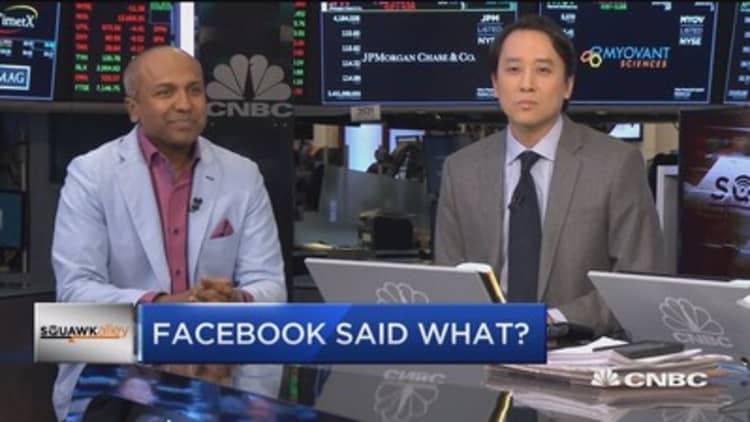As concerns about inappropriate content on Facebook increase, some advertising agencies are recommending against buying certain types of Facebook ads. But so far, advertisers are not heeding their warnings — Facebook's audience is too large and its targeting too good.
Facebook is maxing out on places to put ads in the Facebook News Feed and Instagram areas without annoying its users. Instant Articles and Audience Network provide alternate Facebook-owned venues to put ads and gain revenue, but several agencies have become concerned enough about fake news and trolling to warn their clients away from these products.
Digitas, whose clients have included Buick, Dunkin' Donuts and Whirlpool, has expressed concerns about Facebook's Audience Network, a program that lets advertisers buy ads on a network of third-party websites. It is also cautious about Instant Articles, a way for publishers to upload their articles onto the Facebook platform.
"Digitas advises clients against running [ads] in Audience Network or Instant Articles until the point at which Facebook provides 100 percent transparency on the partners within its network and simplified tools for us to control where our ads are placed," said Jeanne Bright, vice president and group director of paid social at Publicis' DigitasLBi.
The majority of the Facebook ads Digitas buys for its clients are in the Facebook News Feed, Instagram and Instagram Stories, all of which are safe for advertisers, Bright said.
Noble People, an ad agency that has worked with Coca-Cola and PayPal, is also concerned about Audience Network. Noble's media director, Matt Borchard, explained, "there's no control as to where you show up and video is served as mid-roll which as a consumer I absolutely loathe."
Transparency tools 'continuously delayed,' complains one agency
Facebook does have tools to prevent ads from appearing next to questionable items, including options to blacklist certain categories and topics. Companies can also blacklist specific websites and apps within Audience Network and Instant Articles. It also increased standards for which types of publishers can receive ad revenue in an effort to boost quality.
But Facebook's main olive branch to advertisers has been a promise to list exactly where ads could potentially run and did run, especially on Instant Articles and Audience Network.
That feature was announced in September, and still isn't available. Digitas' Bright points out this feature is "continuously delayed."

"My issue with these lists is that they aren't 100 percent transparent with listing every single site/article/video your ad runs against – that's what we'd need to feel absolutely comfortable running there," said Bright. "From what I've heard from Facebook, the lists will be 90 percent-plus transparent — though that percent isn't firm — mostly because they have agreements with some publishers that don't allow them to be completely transparent. They won't share who those publishers are either."
A source close to Facebook said while the company can provide all the places an ad may potentially run, it's still working on being able to provide where ads actually ran.
Ideally Facebook would allow third parties to audit for brand safety like DoubleVerify, Oracle's Moat or Integral Ad Science as other digital media companies allow, Bright said. However that option isn't being discussed, she said.
A source with knowledge about the situation said Facebook plans on fully launching pre-ad-campaign lists for those two products by the end of Q1, while post-campaign lists should be available to all advertisers by mid-2018.
No other options
But though companies are aware of the dangers, most won't leave Facebook, said Noble People's Borchard.
So far, none of its clients have pulled money for safety issues.
"Facebook's pure size and targeting capabilities make it easily the best place to capture sales, next to Google," Borchard said. "CPMs (ad price of 1,000 views) are cheap and targeting is excellent. The duopoly is strong and shows no signs of slowing down."
Overall Facebook is still a "low level of risk" for advertisers, said Interpublic's Huge CEO Aaron Shapiro. The company's move to include more personal content is helping because it highlights better content and increases quality engagement, Shapiro said. Facebook users self-censor because they don't want to embarrass themselves in front of family and friends, who are likely to see their posts. That makes it generally safer than platforms like YouTube, where people can post freely without people in their personal lives knowing, he said.
"Brands are concerned about it, but right now at the end of the day it's a very manageable problem," Shapiro said, whose agency's clients have included LG, Nike, Pfizer and Proctor & Gamble.
Meanwhile, both Facebook and Google are hiring thousands of people to review content, and Shapiro believes both platforms will be able to eliminate most of the advertiser concerns.
"Look at what China is doing with censorship," he said. "If China can censor the internet when the Chinese internet is bigger than the U.S. internet, it can be done."
WATCH: How Facebook can fix its PR problem



